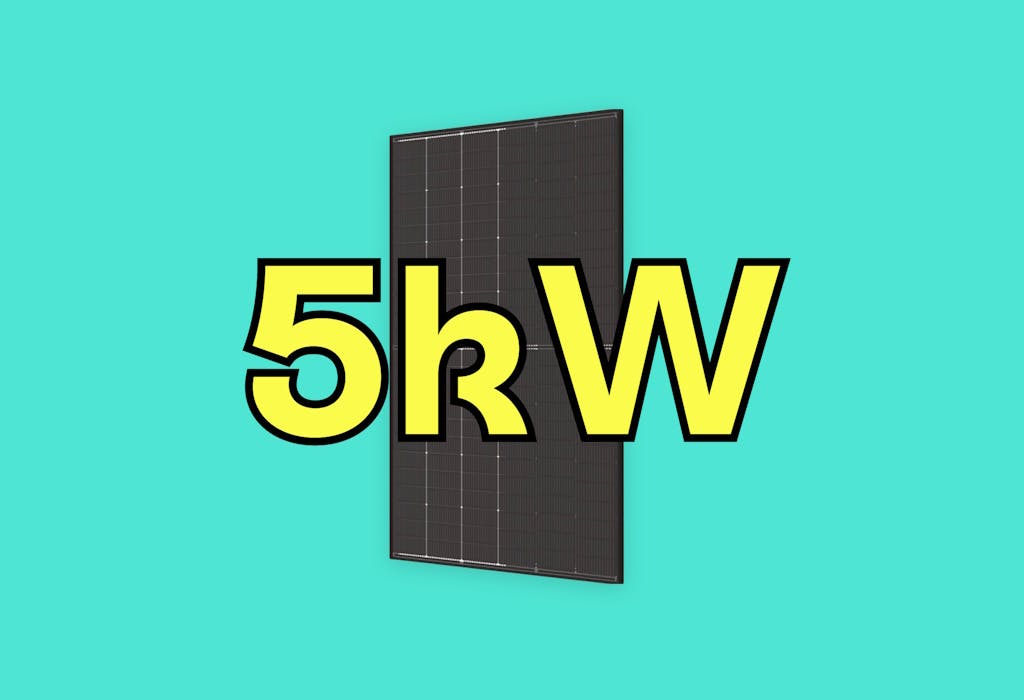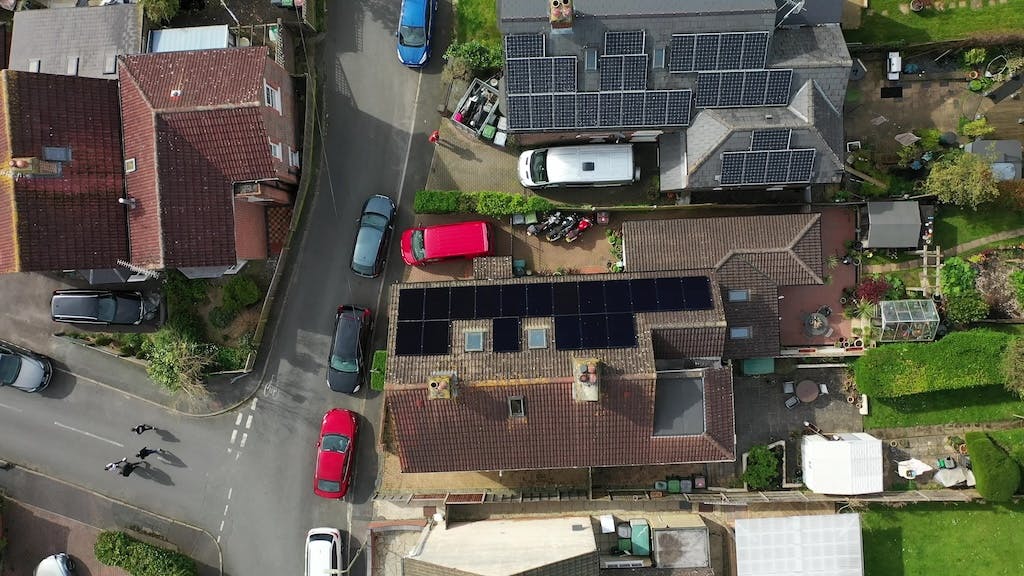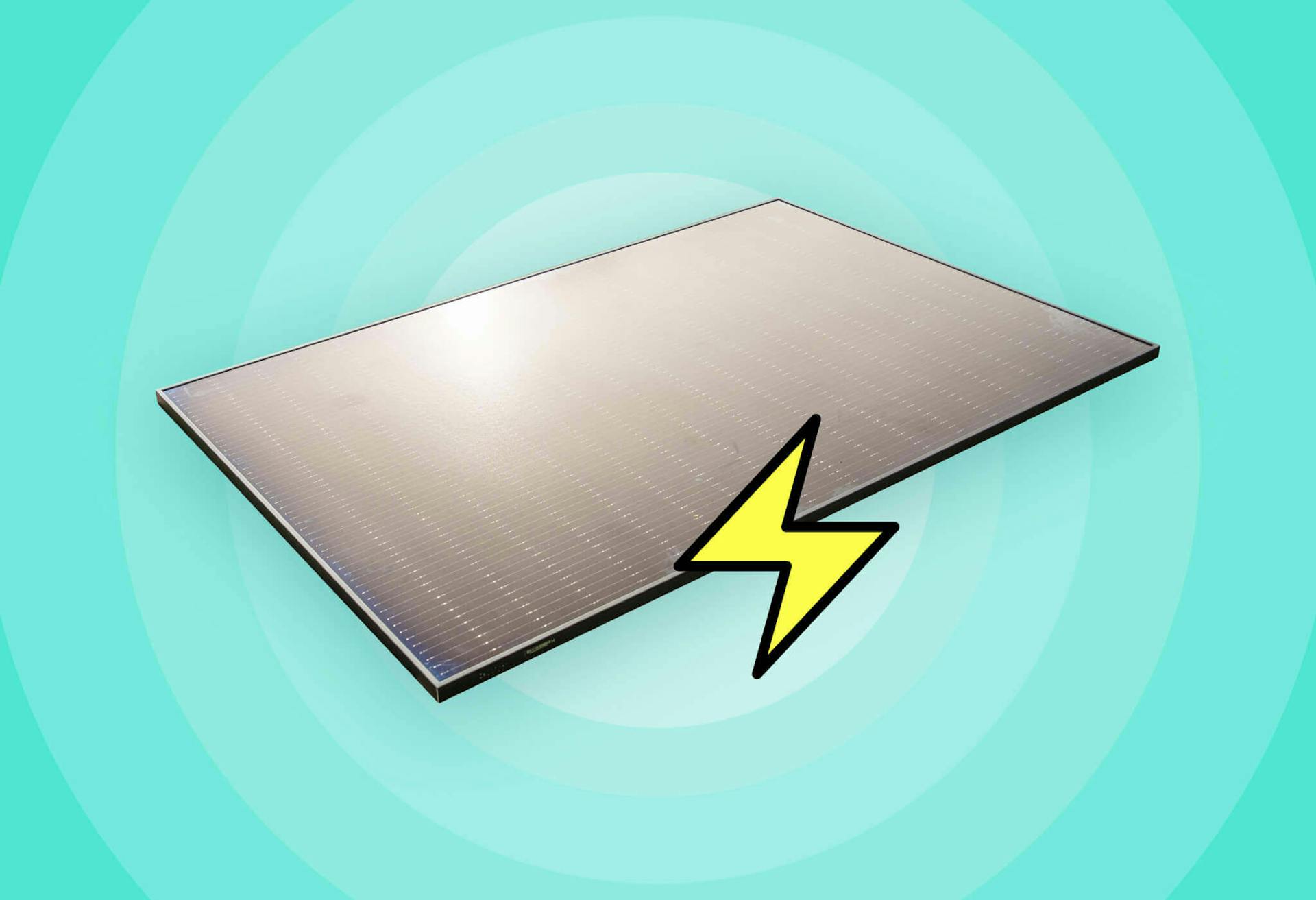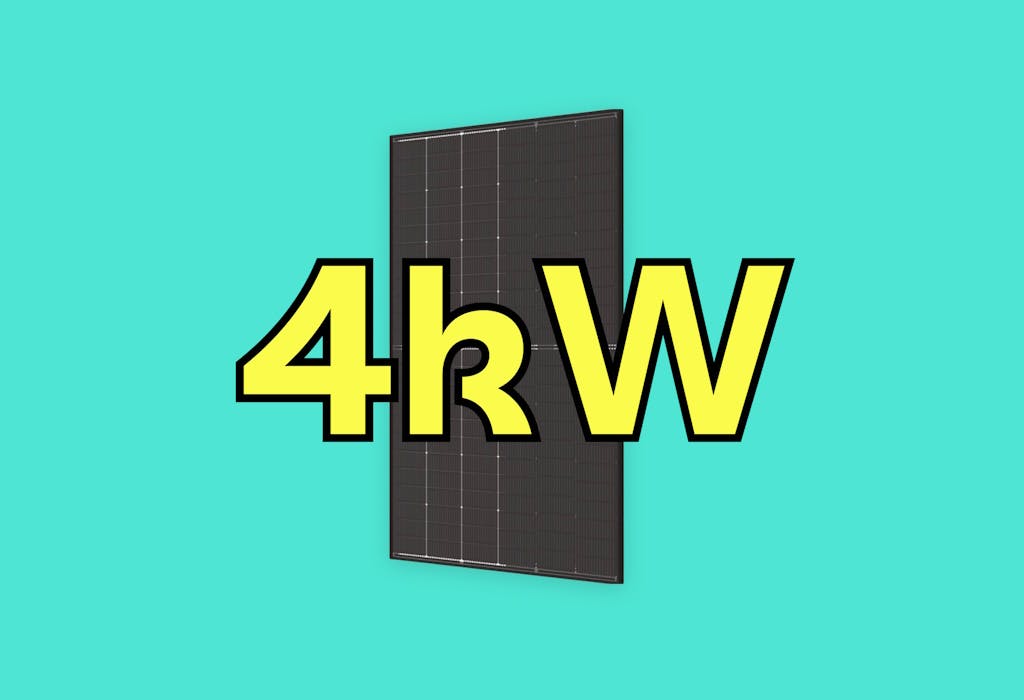- Solar advice hub
- System-size
- 5kW solar panel systems: an expert guide
5kW solar panel systems: an expert guide
Here's what a 5kW solar panel system is, how much it costs, and which devices it can power on an average day.


Why you can trust our content
We know that the solar industry is full of misinformation, but we only use reliable sources, including:
- Our experienced solar experts, installers and system designers
- Our own database of solar & battery system designs
- Authoritative bodies like MCS and the UK government




At a glance
When you’re buying a solar panel system, you want to ensure you’re getting the correct size for your household.
A 5kW solar panel system is usually a safe choice for a four-bedroom property, but this depends on factors like your present and future energy usage and the solar battery you pick.
In this guide, we’ll explain what a 5kW solar panel system is, how much it costs, and which devices it can power over an average day.
If you’re wondering how much a solar & battery system could save you, just answer a few quick questions below and we'll generate an estimate for you.
What is a 5kW solar panel system?
A 5kW solar panel system has a peak output rating of five kilowatts, meaning it produces 5,000 kilowatt-hours (kWh) of electricity per year in standard test conditions.
You can construct a 5kW system by acquiring solar panels with power ratings that add up to 5,000 watts (W) when grouped together.
This doesn’t necessarily mean your system will generate 5,000kWh, since solar panel output is affected by factors including your location, roof angle and direction, and the quality of the installation.
You might also see a 5kW system referred to as a 5kWp (kilowatt peak) system. In this context, both phrases have the same meaning.
How many solar panels are in a 5kW system?
The amount of solar panels in a 5kW system depends on the size of the panels themselves.
If you have a 500W panel, it will produce 500 watt-hours in standard test conditions, which includes a cell temperature of 25°C and solar irradiance of 1,000W per m², and is how companies check a solar panel’s attributes.
This table shows how many panels you’d need (of different panel sizes) to create a system that's at least 5kWp.
| Panel size (W) | Number of panels | System size (kWp) |
|---|---|---|
| 350 | 15 | 5.25 |
| 380 | 14 | 5.32 |
| 400 | 13 | 5.2 |
| 430 | 12 | 5.16 |
| 450 | 12 | 5.4 |
All of these systems will produce at least 5,000kWh per year, under standard test conditions.
But how many solar panels you’ll need in order to install a 5kW system will depend on your panels’ peak power ratings, as you can see in the table above.
The higher your panels' peak output ratings, the more electricity they'll produce, everything else being equal – and the more money you'll save.
What size battery should you add to a 5kW system?
You should generally add a 5-7kWh battery to a 5kW solar panel system.
This enables you to store your excess solar electricity all year round, to use when skies are grey and after the sun sets.
You’ll power your home with more of the abundant energy your solar panels produce in spring and summer, and squeeze every last drop out of the electricity they generate in autumn and winter, minimising wasted energy in the process.
The size of battery you should get will depend on multiple factors though, including how much electricity your household consumes per day, and the shape of your annual usage pattern.
If you have an electric vehicle and charger, for example, and take more trips in the summer, you may use more solar electricity in those hotter months than during winter – which may mean there’s no need for a larger battery.
However, a bigger battery might be a good idea if the people in your household spend most of their time outside of the home while the sun’s up – for instance at school or work – since you won’t be able to use the majority of the solar electricity as your panels produce it.
What size inverter should you add to a 5kW system?
A 5kW system generally needs a 3.5kW inverter, since your solar panel system should be roughly 50% bigger than your inverter, as a rule of thumb.
This is largely because in most UK locations, your solar panels won’t often reach their peak power rating, since our weather usually fails to meet standard test conditions.
Standard test conditions include a solar irradiance of 1,000W per m² and a cell temperature of 25°C, and is the way manufacturers measure a solar panel’s output.
The electricity generated by a 5kW system in the UK can still save you hundreds of pounds per year, but you won’t produce much beyond 5,000kWh per year, even in the sunniest regions.
And it’s a better idea to choose an inverter size that matches your system’s actual output, rather than what it can produce in an ideal scenario.
Every inverter requires a minimum level of power to start working, known as its 'startup voltage', and if you have an inverter that's too large, you may struggle to reach the startup voltage.

The UK's first solar subscription
- No upfront cost
- Fixed monthly fee
- 20-year Sunsave Guarantee
How much does a 5kW solar panel system cost?
A 5kW solar panel system costs around £11,500 to buy and install.
If you want to add a battery to this system, it’ll push the price up by around £2,000, for a total cost of £13,500.
This final cost can vary substantially though, based on factors including where you live, the type of roof you have, the installer you choose, and the current state of the industry.
If you want to learn more, check out our full guide to solar panel costs.

How much energy will a 5kW solar panel system generate?
| Location | Solar irradiance (kWh/kWp) | Average annual output of a 5kWp system (kWh) |
|---|---|---|
| Aberdeen | 830 | 4,150 |
| Nottingham | 908 | 4,540 |
| Norwich | 961 | 4,805 |
| Swansea | 1,011 | 5,055 |
| Brighton | 1,077 | 5,385 |
A 5kW solar panel system in the UK will produce an annual output of around 4,250kWh, if it's dealing with average UK irradiance.
This equates to your system producing roughly 85% of its peak power output – but these figures vary significantly, depending on where you live.
As you can see in the table above, a household in Brighton with a 5kW system will generate 1,200kWh more than the same system in Aberdeen, according to the European Commission's Photovoltaic Geographical Information System.
Your system will generally produce lower amounts of solar electricity in places with less sunshine, such as Scotland or northern England, or more if you live in a sunnier place like Cornwall, Devon, Dorset, Essex, or Sussex.
Output can even vary in the same area, because location is just one part of the equation. There are many other factors at play, including the quality of your system, the direction and angle of your roof, and the amount of shading your system experiences.
To get an accurate idea of how much solar electricity you can generate with a 5kW rooftop system, you'll need to use a top solar panel installer.
What can a 5kW solar panel system run?
A 5kW solar panel system can run the average four-bedroom household, on a typical day.
It can generate 11.6kWh of solar electricity per day, on average.
This amount of electricity can power all of the devices below for the stated amount of time, according to Centre for Sustainable Energy data – with some extra energy left over.
| Device | Time | kWh usage |
|---|---|---|
| Washing machine | 1.5 hours | 3.15 |
| Tumble dryer | 1.5 hours | 3.75 |
| Electric shower | 30 minutes | 0.44 |
| Hairdryer | 15 minutes | 0.45 |
| Oven | 1 hour | 2.1 |
| Toaster | 5 minutes | 0.08 |
| Microwave | 10 minutes | 0.1 |
| TV | 2 hours | 0.24 |
| Games console | 2 hours | 0.24 |
| 2 laptops | 8 hours each | 0.8 |
| 10-watt LED light bulbs | 17 hours | 0.23 |
| Total: 11.58 |
Is a 5kW solar panel system big enough?
A 5kW solar panel system is usually more than enough for a household that uses the average amount of electricity in the UK, which is 3,400kWh.
In the table below, you can see the minimum system size we'd recommend for different electricity consumption levels, based on the idea that it's better for your output to exceed your usage.
| Annual electricity consumption (kWh) | Number of solar panels (400W) | System size (kWp) | Average annual output (kWh) |
|---|---|---|---|
| 3,500 | 10 | 4 | 3,400 |
| 4,000 | 12 | 4.8 | 4,080 |
| 4,500 | 14 | 5.6 | 4,760 |
| 5,000 | 15 | 6 | 5,100 |
| 5,500 | 17 | 5.6 | 5,780 |
If you get a solar panel system that produces more electricity than you consume, you can use this green energy to substantially cut your bills.
You won't be able to use all of it, since your system will sometimes generate more electricity than you could consume, even with a battery. This is often the case on sunny summer days.
Thankfully, you can send this extra power to the grid through a solar export tariff, potentially earning hundreds of pounds per year.
If you want to learn more, read our guide to working out how many solar panels you need.
However, you should always consider getting as large a solar panel system as your roof allows, if you can afford it.
The fixed prices of labour and scaffolding typically make up a large proportion of your costs, so adding more panels doesn’t raise the overall price by much, which means it usually makes financial sense to fill up your roof.
How much space do you need for a 5kW solar panel system?
You’ll typically need 37.8 square metres of roof space for a 5kW solar panel system.
This total takes into account the average height and width of a solar panel – around two square metres – plus the extra spaces installers generally leave.
Your solar installer will usually make sure there’s a 40cm space between the panels and your roof’s sides, and a 3cm gap between each panel, to match the standards created by bodies like Flexi-Orb and Microgeneration Certification Scheme (MCS).
If you have a vent pipe, chimney, or skylight (also known as a Velux window), you’ll require more roof space – but not much.
If you have all three, you’ll usually need another 0.81m², for a total of 38.6m².
Is a 5kW solar panel system worth it?
A 5kW solar panel system is definitely worth it, so long as it’s correctly sized for your household.
If it is, it’ll benefit you in multiple ways. You’ll cut your electricity bills by 108%, on average, based on a household experiencing average UK irradiance that has a 5.3kW solar panel system and a 5.2kWh battery, uses 4,000kWh of electricity per year, and is signed up to the Intelligent Octopus Flux export tariff.
That means across a year, you'll actually earn more than you spend. This might sound too good to be true, but it’s all because of the high performance of modern solar panels and storage batteries, as well as export income.
The panels will dramatically reduce the amount of electricity you buy from the grid, and you’ll also earn money by selling your unused electricity to the grid.
You’ll also shrink your carbon footprint by 1.1 tonnes of CO2 per year, on average - or 31%. This is based on a database of 32 solar & battery systems designed by Sunsave, located across England and Wales. Each system uses 430W solar panels and a 5.8kWh battery.
And it's a 31% reduction because the average annual household carbon footprint in the UK is 3.5 tonnes. This figure is based on a government report that households account for 26% of the UK’s carbon footprint, the country’s latest emissions total of 384.2 million tonnes, and the fact that there are 28.2 million households across the nation at the last count.
So you'll reduce your reliance on the grid, which can help lessen the impact of energy price cap rises.
And a 5kW system can also increase your home’s value. For the average home, solar panels increase the Energy Performance Certificate (EPC) rating by at least one grade, and homes with a higher EPC rating tend to sell for more. For instance, in research from 2023, Rightmove found that increasing a property’s EPC from a D to C lifts its value by 3% (or £11,157), on average.
Do you need planning permission for a 5kW solar panel system?
You don’t generally need planning permission to install solar panels on a home, including 5kW systems.
Domestic solar installations are almost always protected by permitted development rights, which enable homeowners to carry out medium-sized improvements without planning permission.
You’ll usually only have to apply for permission if you live in a flat or listed building, or if you want to install a ground-mounted system.
However, your installer will need to send a G99 application to your area’s Distribution Network Operator (DNO) if your inverter’s maximum capacity is more than 3.68kW on a single-phase system.
This is sometimes the case with a 5kW installation, as your solar panel system should be around 50% bigger than your inverter – which would lead to a roughly 3.5kW inverter – and some installers prefer to fit a larger inverter.
In most cases, G99 applications are accepted without issue; it's just a case of the DNO checking that your local cables can support the flow of electricity that will be coming from your property.
You may also need to apply for planning permission if you live in a listed building. You can sometimes require planning permission in conservation areas, but only if the area has been subject to an Article 4 Direction.
Can you get an off-grid 5kW solar panel system?
You can certainly get an off-grid 5kW solar panel system installed, and in most scenarios, it’ll provide a large proportion of the electricity you need.
Since you can’t export excess energy to the grid, your focus will be on buying a large battery to store as much electricity as you can.
A 10-12kWh battery will likely meet your needs, depending on where you’re living and your electricity usage.
You may also want to add other sources of renewable energy alongside your solar panel system, like a wind turbine.
A 5kW solar panel system will only provide you with enough electricity to live off-grid if you can be careful with your consumption and use significantly less energy in winter.
Next steps
A 5kW solar panel system can massively reduce your electricity bills, and is suitable for the average four-bedroom household.
However, most homes don’t align with the average, so make sure the size of your system is based on your current and future electricity consumption, rather than averages.
The best way to find out the right solar panel system size for your home is to hire a company with the relevant expertise, abilities, and accreditations – like Sunsave.
If you’re interested in how much you could save with a solar & battery system, simply answer a few quick questions below, and we’ll calculate an estimate.
5kW solar panel system: FAQs
Related articles

How many solar panels do I need?
Read full story
How much energy do solar panels produce?
Read full story
4kW solar panel systems: an expert guide
Read full story
Should you get a solar panel subscription?
Read full story
Written byJosh Jackman
Josh has written about the rapid rise of home solar for the past six years. His data-driven work has been featured in United Nations and World Health Organisation documents, as well as publications including The Eco Experts, Financial Times, The Independent, The Telegraph, The Times, and The Sun. Josh has also been interviewed as a renewables expert on BBC One’s Rip-Off Britain, ITV1’s Tonight show, and BBC Radio 4 and 5.